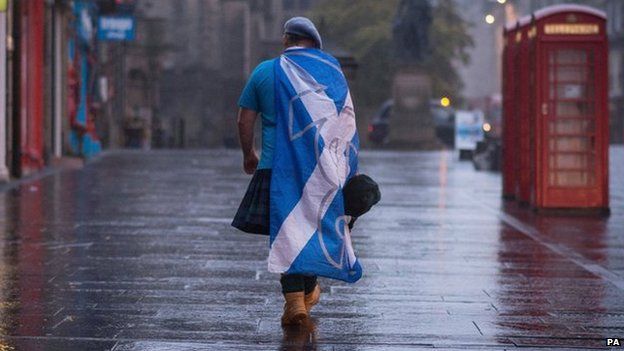Vow 'not crucial in referendum vote', claims report
- Published

The promise of more powers for Holyrood made little difference to the outcome of the independence referendum, according to a new report.
Academics from Edinburgh and Essex universities commissioned a survey of several thousand voters.
The results indicated that just 3.4% of "No" voters saw "The Vow" as the main motivation for their decision.
A spokesman for the SNP said polling immediately after the September vote produced a different result.
The new research by the Centre on Constitutional Change found the biggest factor identified by opponents of independence in making their decision was "feeling British/believe in the Union", cited by 29.5%.
Other factors highlighted included:
- "Too many unanswered questions" (27.8%)
- "Independence would make Scotland worse off" (26.3%)
- "Wanted to vote Yes but it seemed too risky" (5.3%)
Factors identified by Yes voters in explaining their defeat included:
- "Westminster leaders misled Scots over more powers" (41.3%)
- "Press/BBC bias towards No" (17%)
- "Electorate lost its nerve" (11.8%)
Report co-author Ailsa Henderson, of the University of Edinburgh, said: "There is clearly a divergence between the perception among Yes voters that the offer of more powers was an important aspect of the campaign and reality of how No voters reached their decision.
"The issue of 'more powers' is not cited as the main reason for voting No.
"However, Yes voters are convinced it caused a loss of nerve leading to support for the Union."
Her colleague Dr Rob Johns, of the University of Essex, added: "The trajectory of opinion during the campaign suggests that the drift back to No predated the famous 'Vow' on the Daily Record's front cover.
"It is not unusual for a misleading narrative to develop about what swung an election or referendum. According to our data, anyone who thinks 'it was the Vow wot won it' is exaggerating, to say the least.
"However, once these narratives develop, they can be hard to shift. We may well see the effect of this one when voters turn out for the general election in May."
'Substantial majority'
YouGov questioned 4,849 people between 22 August and 17 September, 2014. They surveyed another 3,719 people from 22 to 26 September.
Scottish Conservative chief whip John Lamont said: "All three pro-UK parties came up with plans for a more powerful Scottish Parliament before the referendum and, whoever is in power after the general election, those powers will be delivered to make Holyrood a more responsible and accountable parliament.
"Contrary to Alex Salmond's bluster, we have all been good to our word on delivering these powers."
Political involvement
A Scottish Labour spokesman commented: "While it is interesting to carry out these academic exercises, at the end of the day a substantial majority of the electorate voted to stay part of the UK."
A spokesman for the SNP said: "While we were disappointed with the result of the referendum, this study shows that a clear legacy has been greater political involvement, particularly amongst young people, and that is something to be proud of.
"Polling conducted immediately after the referendum showed that a quarter of No voters regarded the promise of extra powers as important in informing their decision - and nearly 10% of No voters only made up their mind in the last week.
"Undoubtedly, the Westminster parties published the Vow because all of their information indicated that it would have a big impact on the result."
- Published16 March 2015
- Published16 March 2015
- Published1 October 2014